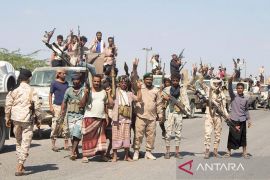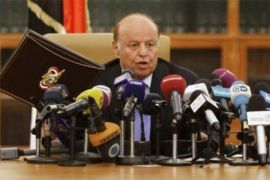Witnesses said pro-Saleh "thugs" had rained bullets from rooftops around a square at Sanaa University, the centre of demonstrations against Saleh, adding that more than 200 people were wounded.
An AFP correspondent saw protesters rush into the surrounding buildings and throw six alleged gunmen from the rooftops.
A 14-year-old boy was shot in the head in front of him.
"We were protesting peacefully and they shot at us. I won`t leave this place until the president goes, even if I have to die," said one demonstrator, Ahmad, 25.
US President Barack Obama strongly condemned the violence, calling on on his key anti-terror ally to live up to a pledge to allow peaceful protests and engage with the opposition.
The bloodshed brought the death toll to more than 70 since the outbreak of demonstrations calling for Saleh to step down after 32 years in power in late January.
"Most of the injured were shot in the head, neck and chest," a doctor told AFP.
Many of the casualties were taken to a makeshift hospital at the university, where witnesses described bodies lined up with Korans placed on their chests.
Saleh expressed his "regret" at the bloodshed, describing the victims as "martyrs of democracy" and accusing those responsible of trying to undermine a peace initiative backed by Saudi Arabia.
"What happened today was very regrettable, the death of our children," he added, a week after saying he had ordered his security forces to ensure the safety of protesters.
Saleh denied to reporters that police had fired any shots, while Interior Minister Mutahar al-Masri said they had intervened only after protesters "made several attempts to break into houses because they were trying to expand in the
neighbourhood."
Yemeni parliamentary opposition spokesman Mohammed al-Sabri accused the regime of a "massacre" and said "these killings will not help keep Ali Abdullah Saleh in power."
Thousands of people have camped out in the square since February 21, demanding the departure of Saleh, an autocratic US ally in the war against Al-Qaeda.
On March 10, Saleh offered to devolve power to parliament under a new constitution and pledged to protect protestors.
The United States, which sees Saleh as a pillar of stability in a fragile region, welcomed the gesture, but Yemen`s parliamentary opposition says the president has lost all credibility and must resign this year.
Opposition leaders last week called off negotiations with the regime but in the wake of Friday`s killings Washington again called for dialogue.
"Those responsible for today`s violence must be held accountable," Obama said in a written statement.
"The United States stands for a set of universal rights, including the freedom of expression and assembly, as well as political change that meets the aspirations of the Yemeni people," he said.
"It is more important than ever for all sides to participate in an open and transparent process that addresses the legitimate concerns of the Yemeni people, and provides a peaceful, orderly and democratic path to a stronger and more prosperous nation."
In the southern city of Aden, a hotbed of unrest even before the protests, tens of thousands of people on Friday attended the funeral of a protester who was killed earlier this week, witnesses said.
"Ali you killer, Ali you slaughterer," their banners read. Mourners chanted: "The people want to overthrow the regime."
Police fired warning shots but there were no reports of clashes.
The protests against Saleh`s regime have been inspired by similar popular uprisings since January that have ousted the longtime presidents of Egypt and Tunisia.
A Yemen-based outfit called "Al-Qaeda in the Arabian Peninsula" is considered the biggest threat to the US homeland, according to a State Department official.
Yemen is the poorest country on the Arab peninsula, although it produces some 300,000 barrels of crude oil per day, and faces a secessionist campaign and tribal unrest as well as Al-Qaeda. (*)
Editor: Kunto Wibisono
Copyright © ANTARA 2011



